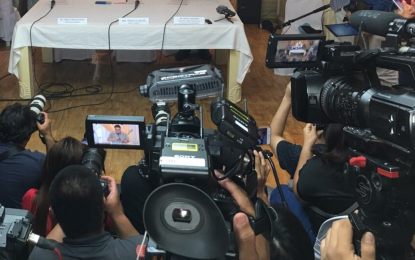
MANILA – With coronavirus disease 2019 (Covid-19) as the common invisible enemy, covering news as the pandemic unfolds in the Philippines has been more difficult for journalists, the front-liners tasked to deliver timely information to the public.
"Nakaka-paranoid sa labas. Mahirap iligtas ang sarili sa kalabang hindi mo nakikita. Tapos paano kung maiuwi mo 'yong virus? Kawawa naman ang pamilya mo (You can’t help but feel paranoid once you are in the field. It's hard to save yourself from an enemy you can't see. Then what if you contract the virus and bring it home. It would be unfortunate for your family)," DZMM reporter Michael Delizo said in an interview.
Michael’s company offers free hotel accommodation for employees opting to stay behind. While under a work-from-home arrangement, Michael goes out when a field assignment calls for it.
In the first few days of the enhanced community quarantine, he covered the situation in Ninoy Aquino International Airport as international passengers scrambled to get out of the country. He also touched on the issue of water shortage in a time when sanitation and hygiene are essential to fight the virus.
"Noong una, natatakot ako mag-cover sa mga high-risk area. Pero wala, trabaho mo iyan. Walang ibang gagawa niyan. Ngayong may lockdown, maraming boses na kailangang marinig. May mga taong nagugutom, may mga naabuso, may mga nangangailangan ng tulong. Kailangan nila ng media ngayon, higit kailanman (At first, I'm scared of covering high-risk areas. But that's work, no one will do that except you. Now that there's a lockdown, other's voices need to be heard. There are people getting hungry, abused, and need help. The media is needed)," he said.
The same goes for PTV4 reporter Allan Francisco who's been reporting on the ground since day 1. While it can be described as "fruitful", Allan said the setup is much harder than his Marawi siege coverage in 2017.
"So far, this is the most challenging coverage but fruitful at the same time since we get to deliver the much-needed news to the public. I've covered war in Marawi, I covered the eruption of Taal volcano. Sa Marawi muntik na akong tamaan pero at least alam ko anong iilagan, ano 'yong kalaban, dito kasi hindi (In Marawi, I almost got shot but at least I know what's coming, who the enemy is, here, you don’t see it)," he shared.
Unlike other coverages, Allan added this is the first time he's compelled to stay out of home so as to protect his family.
"In my Marawi coverage I could easily return to Cavite after. Such coverages could really take a toll on you. Back then, when I cover a big story like the Taal Volcano I would share what happened the moment I come home, I'm just thankful I was always with my family. At present, I'm away from them, we talk mostly on video chats, that's why this is the most challenging," he said.
'Vital role'
Meanwhile, Allan and Michael elaborated the importance of media in the time of Covid-19 pandemic.
"Kung walang reporters sa labas, kulang ang makikitang impormasyon ng publiko at hindi magiging sapat iyon para pagbasehan what is really happening (If there are no reporters, the information that would reach them is incomplete and it wouldn't be enough to get a grasp of what's really happening). We're not merely observing, we get interviews from the experts or the people affected," Allan said.
More than breaking news, Michael added that media's role is vital in stemming misinformation about Covid-19 by delivering accurate and relevant reports to the public.
"We have a crucial part in preparedness, information dissemination, bridging communication gaps, and simplifying scientific jargons. It is our job to make the people understand the extent of the situation, while preventing panic," he said.
"It is the first time the country faced such crisis and we have to explain details of intricate protocols and guidelines to prevent the spread of the virus," he added.
But aside from this, he said reporting should also go beyond figures and statistics.
"Bukod sa figures, mahalaga ang context ng story. Ang mga tao, hindi lang sila basta numero. May kwento sila, may boses sila. Pakinggan natin ito (Aside from the figures, the context of the story is important. People, they are not just numbers. They have a story, they have a voice. Let's hear it). Numbers are numbers. It doesn’t mean anything without voices and stories," he said.
As of April 4, the country has 3,094 confirmed Covid-19 cases with 144 deaths while 57 have recovered from the highly-infectious disease.
The coronavirus was first detected in Wuhan, China last December and has spread to at least 181 countries and regions around the globe.
The global death toll from Covid-19 crossed 60,000 while confirmed cases have exceeded 1.1 million and 233,000 have recovered, according to figures compiled by U.S.-based Johns Hopkins University. (PNA)
